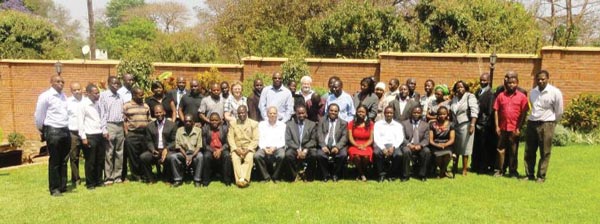The Sustainable Intensification of Maize-Legume Systems for Food Security in Eastern and Southern Africa (SIMLESA) initiative held its annual review and planning meetings for Southern Africa in Chimoio, Mozambique (3-4 September 2012), and Lilongwe, Malawi (6-7 September 2012).
The meeting in Mozambique was attended by 47 participants from the national agriculture research system (NARS) from Sussundenga, Rutanda, Manica, Angonia, and Gorongossa active in SIMLESA-Mozambique, and researchers from the Australian Centre for International Agriculture Research (ACIAR), CIMMYT, International Crops Research Institute for Semi-Arid Tropics (ICRISAT), Queensland Alliance for Agriculture and Food Innovation (QAAFI) in association with the Queensland Department of Employment, Economic Development and Innovation (QDEEDI), and Agriculture Research Council of South Africa (ARC-SA). It was opened by Feliciano Mazuze on behalf of the director general of Instituto de Investigaçao Agraria Mozambique (IIAM), and praised by John Dixon, ACIAR principal regional coordinator and research program manager, who congratulated the SIMLESA team on the promising achievements to date.
The participants had the opportunity to attend site-specific presentations by NARS partners and discuss new partnerships with the private sector and NGOs willing to join SIMLESA. These new partners include Dengo Commercial, Associação dos Produtores de Oleaginosas (IDEAA-CA), and Instituto Superior Politécnico de Manica (ISPM). They agreed on expanding SIMLESA activities in new communities in line with the SIMLESA target of reaching out to 100,000 farmers within 10 years. The meeting was concluded with presentation of certificates of participation to extension staff and IP members who had participated in the training facilitated by ARC-SA in Chimoio, Mozambique.
The Malawi meeting was attended by 36 NARS officials from Kasungu, Mitundu, Balaka, Ntcheu, Salima, and Mchinji active in SIMLESA-Malawi, and researchers from CIMMYT, QAAFI in association with QDEEDI, International Crops Research Institute for the Semi-Arid Tropics (ICRISAT), ARC-SA, Malawi Agricultural Sector Wide Approach (ASWAp), Bunda College of Agriculture, and CPM Agri-Enterprises. Mackson Banda, program steering committee member, expressed satisfaction with the levels of achievements within SIMLESA-Malawi during his opening speech, as significant improvements have been achieved in program implementation and data generation since the last in-country review and planning meeting. The meeting consisted of presentations on adoption survey findings, on-station trial results, and conservation agriculture. The participants agreed that scaling out the initiatives and the innovation platforms engagement remain to be the key challenges. To address some of the issues, ASWAp agreed to include farmers participating in SIMLESA in the government-initiated subsidy program.

 Climate adaptation and mitigation
Climate adaptation and mitigation 
